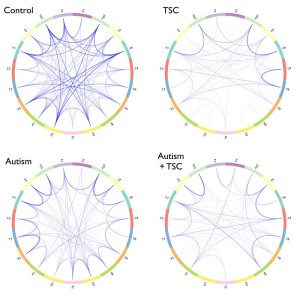 structures of neurotypical children versus children with autism, Tuberous Sclerosis Complex (TSC), and children with both TSC and autism.
structures of neurotypical children versus children with autism, Tuberous Sclerosis Complex (TSC), and children with both TSC and autism.
The connectomes pictured are simple sets of 19 neurons, and the connections between them. The upper left connectome is an average of 46 neurotypical (healthy) children, and shows many short and long range connections. The other three connectomes, from 59 children (in three sets), show markedly reduced long range connections. Instead they show increased short range connections (more dense connections within a single discreet brain region). Presumably, the research is consistent with what observations of typical “highly focused” attentional systems of children with autism, who tend to be able to remember intense detail but are also less able to make connections between certain things (such as why a face is expressing anger).
While this research measures a minuscule fraction of the brain’s approximately 100 billion neurons, the findings are consistent with the expectation that atypcially functioning human (and animal) brains will have impaired connections between the many brain regions. The search to map the human connectome (all of the connections within the brain) is in its infancy, and is far more complex than the human genome project was. For more information about the human connectome, see http://www.humanconnectomeproject.org/.
Whether a brain has more or fewer internal connections, a goal of the Integrative Client-Centered Model ICCM) is to promote the creation of new neural connections and to help people maximize the use of existing connections for optimal decision making.
Brain functional networks in syndromic and non-syndromic autism: a graph theoretical study of EEG connectivity, BMC Medicine 2013, 11:54, by Jurriaan M Peters, Maxime Taquet, Clemente Vega, Shafali S Jeste, Ivan Sanchez Fernandez, Jacqueline Tan, Charles A Nelson, Mustafa Sahin and Simon K Warfield in BMC Medicine. Published online February 27 2013 doi:10.1186/1741-7015-11-54
The full study is online at http://www.biomedcentral.com/1741-7015/11/54
See also Neuroscience news at http://neurosciencenews.com/network-analysis-of-the-brain-may-explain-features-of-autism/
